trump

For faith activists and leaders committed to continuing their work to oppose and resist Christian nationalism, President-elect Donald Trump’s return to the White House is disappointing but not a sign of total defeat. Ahead of Inauguration Day, many activists are continuing their coalition-building efforts and sounding the alarm on specific policies they believe Trump may sign executive orders on, day one in office.

We are in for a difficult four years as a country. During the first four years of Donald Trump’s administration, I did not hesitate to call him a fascist, and looking ahead to his next four years, I am so worried about vulnerable people in this country. I am worried about immigrants. I am worried about queer people and trans kids. I am worried, yes, but I know that even in the most difficult time, miracles are possible.

Rev. Jes Kast started planning for the Sunday after the election in midsummer, before her three-month sabbatical. She’d timed her leave intentionally, wanting to return to her congregation well-rested, right before one of most contentious elections in U.S. history. “I had a sense in my spirit that this next phase in ministering, whatever the outcome of the election, would require me to be as spiritually grounded as possible,” said Kast, who pastors Faith United Church of Christ in State College, Pa.
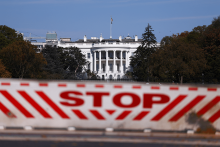
Trump’s campaign was marked by racist and misogynistic rhetoric, promises of authoritarian tactics including dramatic expansion of executive power and retribution for his political rivals, as well as policies that appealed to the anxieties of conservative religious communities, especially Christians.
As faith and justice leaders absorbed the news of a second Trump term, many pointed to the importance of fostering and caring for self and neighbor while figuring out what to do over the next four years.
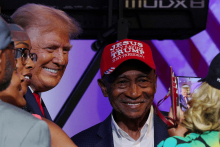
Armed with the message that Americans have become too morally liberal and strayed too far from God’s light, a few Black conservative Christians, like Pastor Lorenzo Sewell, are trying to upend the historic support of Black Protestants for the Democratic party.
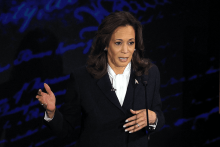
As Vice President Kamala Harris and former President Donald Trump discussed abortion policy during their first debate, Harris vigorously defended her vision for federal abortion rights. While she did, she returned to a talking point meant to appeal to religious voters.
“[Under Trump’s abortion bans] a survivor of a crime — a violation to their body — does not have the right to make a decision about what happens to their body next. That is immoral,” Harris said, before connecting morality and faith. “And one does not have to abandon their faith or deeply held beliefs to agree: The government, and Donald Trump certainly, should not be telling a woman what to do with her body.”
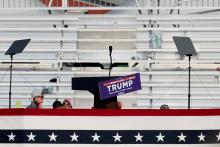
“It’s a shame he missed.”
That was the first thought I had when I saw that someone had attempted to assassinate former President Donald Trump. My second thought was, “You shouldn’t think that — you consider yourself a peacemaker and pacifist.” I wondered how my Christian commitments could erode so quickly.
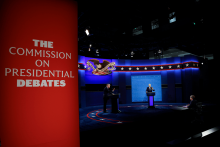
With presumptive Republican nominee Donald J. Trump and presumptive Democratic nominee President Joe Biden preparing for their upcoming presidential debate on June 27, what do Generation Z Christians hope for in the 2024 election?
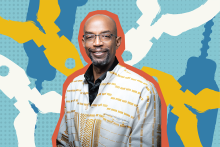
If you’re the type of person who discusses politics online, you’re likely to have heard of Godwin’s law. In 1990, Mike Godwin, a First Amendment lawyer, invented this rule to address a common occurrence: The longer online debate drags on, the more likely someone commits the fallacy of reductio ad Hitlerum — i.e., the comparison of someone or something to Adolf Hitler or the Nazis.
Invoking Nazis, as Godwin suggests, is a lazy way of ending a debate. I also think it’s usually motivated by a shallow understanding of history and an insensitivity toward Holocaust victims.
But there’s gotta be times when referencing the Nazis is warranted, right? I’ve been thinking about this a lot lately as U.S. politics continues down the path of polarization and a segment of Christians unabashedly preach a message of domination. We need a sharper critique of Christian nationalism and the Republican presidential candidate Donald J. Trump that’s deeper than simply labeling the former group as “Nazis” and the latter individual “Hitler.” But where do we begin?
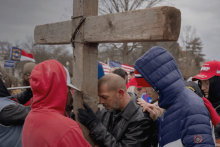
The new documentary God & Country, inspired by Katherine Stewart’s book The Power Worshippers, fortunately escapes most of the major pitfalls of political documentaries as it addresses the rise of Christian nationalism.
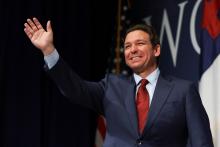
Former President Donald Trump and Florida Governor Ron DeSantis made their cases to evangelical voters who gathered in Washington, D.C., for a pair of events on Friday, seeking an edge with a voting bloc likely to play a pivotal role in selecting a 2024 presidential nominee.
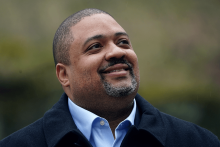
Manhattan’s District Attorney, Alvin Bragg, is best known these days for leading the probe of whether former president Donald Trump and his company broke state laws in 2016 to buy Stormy Daniels’ silence about an alleged affair.

Yet, in this charged atmosphere, Jesus calls us to be peacemakers — regardless of our political leanings or party affiliation. So, what does peacemaking look like during the upcoming midterms?
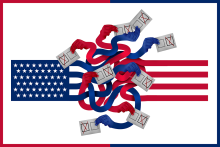
JUST AS FOR 50 years Ohio was a bellwether for presidential elections, since 2011 North Carolina has become a testing ground for Far Right legislation aimed at controlling federal election administration. In his book Indecent Assembly, author Gene R. Nichol says North Carolina is now “a laboratory for extremism.”
In September, the Supreme Court included on its docket a Republican-backed case out of North Carolina that pits voters against a state legislature that seeks to greatly increase its power over elections by limiting the ability of the state judiciary to review the actions of the legislature. This could potentially unbalance the fundamental checks and balances essential to a functioning democracy by giving one body total control over a function of government.
While the specific case of Moore v. Harper deals with whether the North Carolina state Supreme Court has the power to strike down state legislation that produced illegally gerrymandered voting districts, the federal Supreme Court will deliberate on whether the U.S. Constitution’s election clause, the primary source of constitutional authority to regulate elections, prevents a state judiciary from ordering a state legislature to comply with federal election laws.
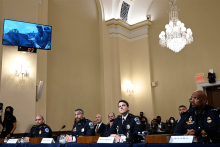
When the hearings air at 8:00 p.m. Eastern on major broadcast networks and many cable news channels, I will be watching. And I hope you watch too, even if you don’t consider yourself a political wonk. These hearings will be crucial for the future of our nation and our democracy; it’s imperative that Christians tune in and encourage others to do the same.

A Reuters analysis of emergency applications over the past 12 months offers a glimpse into the full range of parties seeking urgent relief from the top U.S. judicial body through the shadow docket. The justices have increasingly relied upon this process to make rulings in a wide array of cases without the normal deliberative process involving public oral arguments and extensive written decisions.

FOR MORE THAN a century, evangelical Christians in the United States have frequently and variously imagined an apocalyptic upheaval that would usher in a new world. Evangelicals have had no shortage of appetite for cataclysmic stories, though they have differing interpretations of the biblical texts that describe the “end times,” as demonstrated by the popular appeal of the Left Behind series in the early 2000s. This craving is evident in the way that Christian visions of a final battle between the forces of darkness and light have been woven together with the conspiratorial narratives of QAnon.
In the U.S., Australia, and elsewhere, the far-right conspiracy theory QAnon is growing rapidly among New Age adherents and anti-vaccination communities. However, as religion reporter Katelyn Beaty has noted, there is explicitly Christian-sounding language in QAnon messaging. Explicit examples of the blending of Christian apocalyptic language and the QAnon conspiracies can be found in web posts and books published in the wake of the alleged “revelations” of the anonymous web poster “Q.” In these texts, Donald Trump is often presented as God’s anointed, an equivalent to King Cyrus, battling the diabolical forces of the “Deep State” (a conspiracy theory that posits a hidden government working within the legitimately elected government). The Deep State—supposedly composed of individuals such as Hillary Clinton, Pope Francis, and well-known celebrities who are often described as demonically controlled—is said to be guilty of the most savage crimes, including child sex trafficking and using their victims’ blood to extend their own lives.

AT THIS POINT, vaccines for COVID-19 have been administered to hundreds of thousands of Americans, all of whom waited patiently for Donald Trump’s family to be treated first. Also, to all Republicans in the House and the Senate who tried to overturn the election. And people named Rudy, probably. This follows the latest Centers for Disease Control and Prevention guidance that assigns first priority to people who attempt to undermine democracy. Repeatedly. (Hopefully, the vaccine will also include a dose of shame, for those who have none.)
So far, few side effects from the vaccine have been reported, other than mild headaches, a slight fever, and an uncontrollable urge to watch The Queen’s Gambit again. Some recipients exhibited abhorrent anti-social behavior, which experts feared was a psychological reaction to the injection. But it turned out Sens. Josh Hawley and Ted Cruz (R-Sedition) have always been like that. The vaccine was not the cause and, sadly, not the cure.
Meanwhile, those of us still waiting for the vaccine are honoring the clear protocols of the CDC. Vaccinations first go to health care workers, then to the elderly, particularly those in senior care centers. Fortunately for me, the wait won’t be much longer. Because of my daughter I’m nurse-adjacent, and if I throw my arms around her for a well-timed hug, who’s to say which arm gets the shot? I’m also well over 65—the minimum age for elderly recipients—although I’m cursed with the body of a 64-year-old. I hope that won’t count against me.
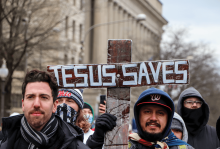
Madison Muller is a graduate student studying social justice and investigative journalism at Northwestern University's Medill School of Journalism. She spoke with Sojourners' Jenna Barnett.
“I GOT TO Federal Plaza around noon, right when Trump’s speech was starting. I sat with a group called the America First Coalition. They had plugged a phone into a megaphone and were standing in a circle listening to the speech. I sat right in the middle to listen. Ten minutes in, Trump started speaking about his distrust of the media and [how they were] complicit in the ‘rigged’ election. That’s when I started getting a little bit fearful. I could see people looking at my press pass. When I said that I was a graduate student journalist, one of them said, ‘We don’t like people in grad school.’ And then they started yelling at me, ‘We hate the media! Get out of here!’
A larger group started forming in the street. I [ended up] at the front of the group when they walked to the Capitol. I saw people in bulletproof vests, people with military tactical equipment, walkie-talkies, helmets, goggles; people had batons in their backpacks. There was this acceleration toward the Capitol. I remember thinking there is just nothing that’s going to stop the momentum of this group. I was surprised by the lack of law enforcement that I saw, especially after having covered racial justice protests since May, where there’s always such a heavy police presence.
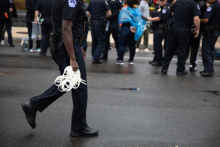
Less than a week into the new year, the country watched in shock as hundreds of rioters used metal pipes and tear gas against police to gain entry into the U.S. Capitol, ransacking congressional offices for several hours while the nation’s elected leaders, who had convened to certify electoral votes, huddled for cover. But faith-based communities and other justice advocates saw something like this coming.